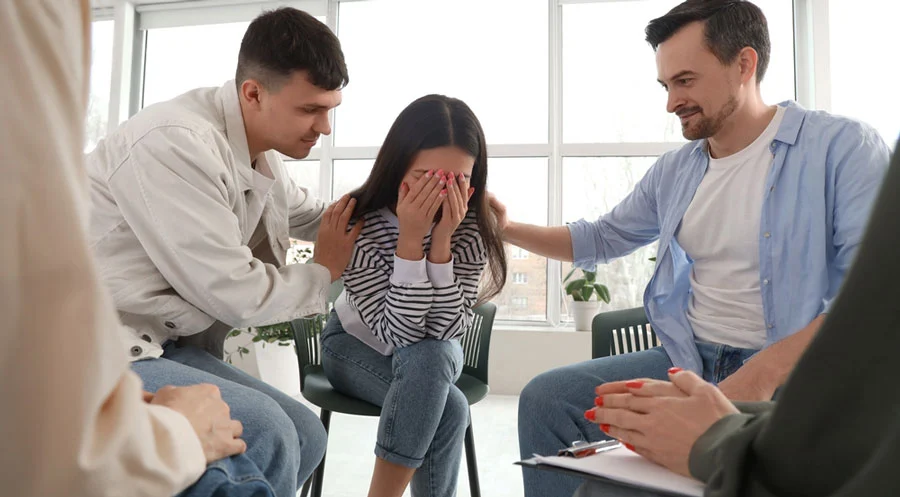Get Affordable IOP Programs for Orange County at South Shores
The road to recovery is different for everyone. Intensive outpatient programs (IOP) offer a beacon of hope to those struggling with substance abuse or mental health challenges. They are an important resource for those who need support, even if they cannot seek inpatient treatment due to the costs, responsibilities like school, work, or childcare, or other reasons.
IOPs are also a step down from residential programs and are sometimes used to provide extra support as you adjust to life after inpatient care. Regardless of your reasons for seeking services, you are likely wondering, “How much does IOP cost with insurance?”
The cost of IOP and other treatment options can be a challenging obstacle on your road to recovery. It just isn’t right. Fortunately, if you have insurance, attending an intensive outpatient program (IOP) might not cost anything.
Many people don’t know if they’re covered. If you reach out to South Shores Recovery, we can easily verify your insurance and let you know the costs (if any) over the phone. Some people may also qualify for sliding scale fees, financial assistance, or payment plans.
Keep reading to learn more about intensive outpatient programs, costs, and alternative options for treatment at South Shores.
What is an Intensive Outpatient Program (IOP)?
Intensive outpatient programs in Orange County, or anywhere else for that matter, don’t look the same at every facility. At the typical IOP treatment center, however, you’ll work with an individual therapist, attend group therapy, and learn skills to help you overcome your struggles. Some people may also meet with a psychiatrist for medication-assisted treatment and medication management.
Group therapy is offered throughout the week, with some treatment facilities even offering nighttime and weekend sessions. The frequency of meeting with other specialists changes depending on your specific needs.
When you choose South Shores, you’ll work with addiction counselors and mental health professionals dedicated to your recovery. After meeting an intake specialist, we’ll work with you to craft a comprehensive mental health or addiction treatment plan that works for you, your schedule, and your budget.
Our intensive outpatient programs offer more support than traditional outpatient options like attending therapy, psychiatry, and support groups.
While you receive this support, you’ll also be able to put the coping skills and strategies you’ve learned into practice. This is beneficial to people receiving mental health treatment because they can be monitored while they adjust to medication or better learn to manage symptoms. For those recovering from substance use disorders, this can be a crucial part of relapse prevention.
Who is IOP For?
Intensive outpatient treatment programs work well for many people. If you are a college student or attending school, IOP is available after hours so you can still focus on education. It also works well for people who cannot get the time off work for treatment, parents who must take care of children while they receive help, and people who cannot afford the cost of residential treatment programs.
IOPs are also a good choice for people who have completed inpatient treatment programs. They are a step down from residential services and provide extra support while you ease back into your life. Some people also attend outpatient programs while at a sober living facility.
Finally, our intensive outpatient program (IOP) might benefit people with manageable symptoms. For example, someone who has detoxed but who needs help staying sober. Or, it could benefit someone with trauma who doesn’t feel comfortable in an inpatient setting.
Evidence-Based Therapies for Mental Health and Addiction Treatment
South Shores Recovery offers a variety of evidence-based therapies and treatments. It does not matter whether you are struggling with depression, anxiety, trauma, borderline personality disorder, bipolar, substance use disorder, or a combination of issues.
Our experienced, knowledgeable staff is ready to help you overcome these things. Some of the treatments offered include:
- Dialectical behavioral therapy
- Cognitive behavioral therapy
- Cognitive processing therapy
- Eye movement desensitization and reprocessing
- Acceptance and commitment therapy
- Motivational interviewing
- Life-enhancing therapies like art and surf therapy
Furthermore, South Shore’s practitioners teach life skills, help with employment training, and can help you find aftercare once you’ve graduated. Our clinicians truly understand that people who come to them for help are rebuilding their lives. Let us help set you up for success!
What is the Difference Between an IOP and a PHP?
An intensive outpatient program (IOP) is similar to a partial hospitalization program (PHP) because they are both outpatient programs that give clients extra support. However, partial hospitalization programs are typically more intense, with longer hours.
They are best for clients who need more structure and support during mental health or addiction recovery. Though, the cost of IOP is typically lower.
Deciding if an IOP is right for you can seem like an impossible task. However, you don’t have to make that decision alone. Set up an intake with South Shores today to discuss IOP therapy options for mental health and addiction treatment.
How Much Does an Intensive Outpatient Program Cost with Insurance?
Under the Affordable Care Act, health insurance companies must provide coverage for mental health services and substance abuse treatment. However, there are instances where you will have out-of-pocket costs for IOP, behavioral health services, and drug or alcohol addiction.
This is most likely to happen if you have private and typically pay out-of-pocket costs. While you can check your insurance coverage, it can be hard to decipher what exactly is covered. It’s much easier to reach out to South Shores for insurance verification.
Intensive Outpatient Program Costs without Insurance
Without insurance, intensive outpatient program costs can be anywhere from $400-700 or more for each day of care. Several factors affect the cost of IOP programs. The therapies involved, your health insurance coverage, the location of the treatment facility, and its amenities all matter.
Some treatment centers also specialize in luxury treatment, holistic IOP programs, female clients, male clients, or other areas. While some facilities offer low-cost outpatient treatment, making them more accessible, the same quality of care isn’t always offered at these facilities.
When it comes to IOP drug addiction treatment programs, for example, the rate of relapse is lower for people who start with the right support. You’ll find what you need at facilities like South Shores that offer comprehensive treatment plans, provide support during and after recovery, and who use evidence-based therapies.
Can I Get Help with the Cost of Intensive Outpatient Programs?
Yes, even if you don’t have health insurance, there are options to help with the cost of mental health or addiction treatment services, including intensive outpatient programs (IOP). Some options to absorb the cost of intensive outpatient treatment include payment plans, employee assistance programs, and financial assistance programs.
Some treatment facilities offering IOP, behavioral health programs, addiction treatment, and mental health treatment also use sliding scale fees. You’ll provide proof of your household size and income and the cost of treatment will be adjusted. This makes the inpatient or outpatient program you choose more affordable.
How to Find Out if Your Insurance Covers IOP
The easiest way to find out how much IOP treatment costs are covered by your insurance provider is to call South Shores Recovery. Our caring Admissions team can easily verify your insurance over the phone and answer any questions you may have about insurance coverage levels, mental health coverage, or addiction treatment options.
Alternatives to Intensive Outpatient Treatment
One of the goals of an IOP is to provide more support than you’d find in therapy and support groups while being less of a time commitment than residential treatment. This type of structured outpatient care is effective, but should you decide on another course of treatment, there are still options for treatment.
Inpatient Addiction and Mental Health Treatment
Having a distraction-free, drug-free, and supportive environment during recovery makes all the difference. If you are struggling with drug and alcohol addiction, an inpatient treatment center may be best as you detox from substances.
Additionally, if you have severe mental health issues like violent outbursts, intense flashbacks, or suicidal ideations, a residential treatment facility may be the best course of treatment.
Other Alternatives to IOP Treatment
Often, the most effective treatment option for either substance use disorder or mental health concerns is whatever works best for you. Some outpatient alternatives include sober living, partial hospitalization programs, counseling services, group therapy, and working with peer groups.
PHPs are also often covered by insurance, and are more intensive, being designed for people struggling with substance abuse and other issues who will benefit from more structure and support. Various individual and group therapies will also be important during recovery. You’ll work with treatment providers and discuss shared issues with your peers.
Some people continue to receive services their whole lives, while frequency decreases with time. This continued commitment to bettering yourself gives you the best chance at better treatment outcomes and an improved quality of life.
Dual Diagnosis Treatment
Often, people who struggle with substance use disorder also have mental health concerns. This can be secondary to substance use, such as depression or anxiety. Other times, these conditions occur on their own and you may turn to substances to relieve your symptoms.
Likewise, people who have mental health struggles may become addicted to drugs or alcohol after using it as a coping mechanism.
Our dual-diagnosis treatment program addresses drug and alcohol use disorders in addition to underlying mental health conditions. It’s critical to treat both problems to fully overcome them. If you treat one without addressing the other, the chance of relapse is significantly higher. At South Shores, dual diagnosis is available at all levels of care, including intensive outpatient treatment.
What Happens After Completing IOP?
After completing IOP treatment, most people continue to work with a mental health professional, even after seeking addiction treatment. They’ll help you identify triggers and understand the reasons you might drink or use drugs. For people with mental health struggles, they can help you change negative thought patterns and address trauma.
A therapist will also teach you coping skills. Some people also work with a psychiatrist or receive other medical services to manage pre-existing conditions including chronic pain or existing mental health disorders.
South Shores excels at providing aftercare for clients. We will help you get established with a therapist, psychiatrist, and support groups in your local area. South Shores is also located in Orange County, a prime location for sober living and activities. There is tons of support in the area and it’s always easy to find an Alcoholics Anonymous meeting or Narcotics Anonymous meeting. Benefits like these make it easier to have lasting sobriety after addiction treatment.
Get Support at South Shores Intensive Outpatient Program Today
Whether you are seeking treatment for a mental health condition, unresolved trauma, addiction, or co-occurring disorders, new clients should reach out to South Shores Recovery today.
Many people who have attended rehab at South Shores praise the quality of our duly accredited services, including IOP treatment programs. Even better, these high-quality services and evidence-based treatment programs are free to many clients with insurance.
Call South Shores today to discuss possible treatment options and learn more about IOP costs and insurance coverage. Regardless of your condition(s), schedule, and program costs, there is hope for recovery. Your loved ones and your future self will thank you for taking this step. All you have to do is pick up the phone.





